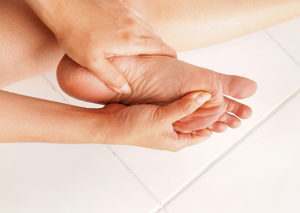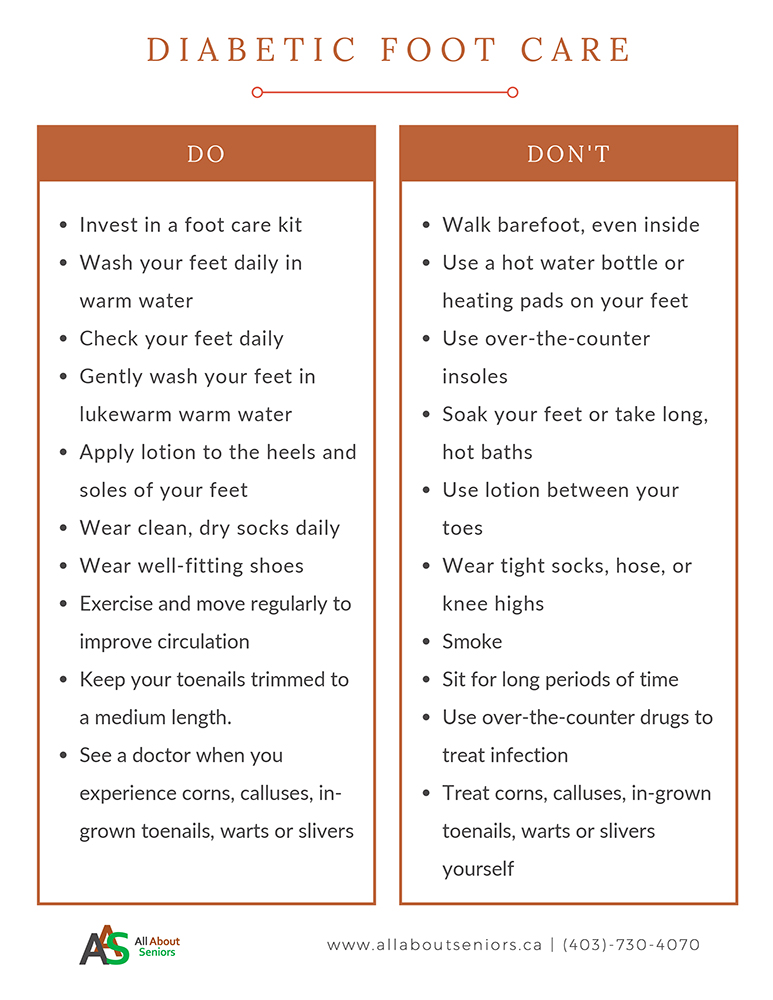Diabetic Foot Care Tips
According to the Public Health Agency of Canada, more than 3 million Canadians are living with diabetes.
It is a chronic condition that can affect Canadians of all ages.
Since this disease can lead to serious foot problems, diabetics need to engage in regular preventive foot care.
While diabetes can have negative effects on your feet, implementing proper foot care will help avoid infections.

How Diabetes Can Affect Your Feet
One of the side effects of diabetes is poor blood flow to the legs and feet.
This can cause injuries that heal slowly, which increases the risk of infection.
In addition, half of those with type 2 diabetes experience damage to the nervous systems, called diabetic neuropathy.
This can cause diabetics to lose feeling in extremities.
This also means that foot issues that might otherwise cause minor discomfort can lead to more significant problems among diabetics.
For example, if you wear a shoe that’s too tight you might get a blister, which can lead to an infection. However, you might not notice the injury until it’s too late due to decreased nerve sensitivity.
In the worst cases, untreated foot problems can result in amputation.
Symptoms
How do you know if you are experiencing diabetic-related foot issues?
While symptoms vary from person to person, the most common warning signs include:
Loss of feeling, numbness, pain, or tingling sensation in one or both feet.
Change of foot temperature.
Blisters or other wounds on your feet, even those that aren’t painful.
Persistent sores on your feet.
Discoloration or red streaks on the skin of your feet.
Swelling or pain of your feet.
In addition, if a foot wound becomes infected, you may experience fever, chills, or shaking.
A foot infection can also cause a significant change in your blood sugar level.
If you think you have a foot infection, seek emergency care immediately.
When to See a Doctor
If you experience any of the above symptoms, you should see your doctor as soon as possible.
You should also schedule an appointment to take care of any corns, calluses, ingrown toenails, warts, or slivers.
You should never try to treat these yourself.
In addition, you should have your feet checked at least once a year by your doctor or podiatrist to screen for any loss of circulation and neuropathy.
During this visit, your doctor should screen you for diabetic neuropathy and loss of circulation.
Tips For Diabetic Foot Care
The experts at Diabetes Canada recommend that diabetics follow a daily regimen to ensure a healthy foot.
As prevention is the best medicine, a daily foot care routine paired with a good diet can help keep your feet healthy.
This daily foot care should include the following:
- Invest in a foot care kit that contains nail clipper, nail file, lotion, magnified mirror, towel and any other equipment you find necessary.
- Gently wash your feet in lukewarm warm water, not hot water. Dry your feet by patting with a soft towel. Make sure the areas between your toes are dry.
- Inspect your feet carefully, especially between your toes, to make sure there are no cuts, cracks, blisters, or nail problems.
- Apply lotion to the heels and soles of your feet to keep dry skin from cracking. Remove any extra lotion.
- Keep your toenails trimmed to a medium length. Cut them straight across and file the edges. Cutting the nail too short can lead to ingrown nails.
- Wear clean, dry socks and be sure to change them daily. Consider wearing socks to bed, especially if your feet get cold at night. Consider socks made for diabetic patients as they have an extra cushion and made from fibre that can wick moisture away.
- Wear well-fitting shoes and don’t let your feet get wet in the rain and snow.
- Exercise regularly, elevate your feet when sitting and move your feet around during the day to improve circulation along with blood flow to your feet.
Beyond this daily routine, you should avoid the following:
- Do not walk barefoot, even inside. You could injure your foot and not even notice.
- Do not wear tight socks, hose, or knee highs. They can restrict circulation to your feet.
- Do not wear over-the-counter insoles. If they don’t fit right, they can cause blisters.
- Do not use over-the-counter drugs to treat calluses, corns, warts, and in-grown toenails.
- Do not use a hot water bottle or electric blanket to warm your feet to avoid burning your feet.
- Do not soak your feet or take long, hot baths. These can unduly dry the skin of your feet.
- Do not use lotion between your toes. Excessive moisture can cause fungal infections.
- Do not sit for long periods of time. You need to promote foot circulation.
- Do not smoke. Smoking restricts blood flow in your feet.
How All About Seniors Caregivers Can Help
In addition to following these guidelines, you need to take care of your diabetes.
Follow your recommend diet and exercise routine and take the necessary medications prescribed by your doctor.
The best thing you can do for your feet is to keep your blood sugar levels under control.
All About Seniors provides personalized foot care for those with diabetes.
Our team of Certified Foot Care Specialists visit you at home to examine your feet and assist with your regular foot care routine.
All About Seniors is sensitive to your individual needs and preferences, and employ safe and gentle techniques.

